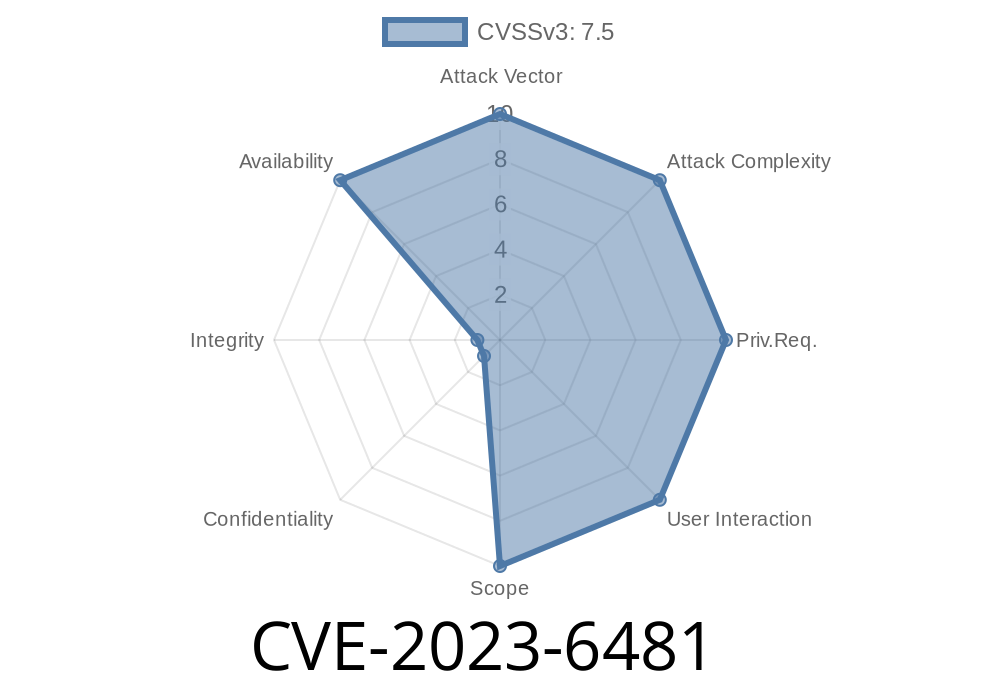If your Java application logs events using Logback and supports remote logging receivers, you need to pay attention to CVE-2023-6481. This flaw exposes affected applications to Denial-of-Service (DoS) attacks via specially crafted serialized data. In this post, we break down the vulnerability in simple terms, show a code example, explain how an attacker can abuse it, and provide links to critical references. Understanding the full picture is crucial to secure your infrastructure.
What is CVE-2023-6481?
CVE-2023-6481 is a serious serialization flaw in the Logback library, specifically within its receiver component. Vulnerable versions include:
Logback Classic: 1.2.12, 1.3.13, and 1.4.13
If you use Logback for distributed logging and allow remote systems to push logs to your application, this vulnerability can be a real problem.
Affected Component
At its core, Logback offers a "receiver" feature (see docs), letting developers configure their applications to receive log events over a network. To transmit events, Logback serializes these objects. If an attacker sends a malicious, poisoned payload, the receiver will deserialize it—triggering memory issues, exceptions, or even infinite loops.
Why is Serialization Dangerous?
Java's object serialization lets a program store and send the state of an object, then reconstruct it later. But deserialization is risky: if you deserialize untrusted data, you're inviting an attacker to tamper with your application's memory and behavior.
In CVE-2023-6481, deserialization isn't protected by type checks or validation. So, if an attacker can reach the receiver port, they may send harmful payloads, causing the application to freeze, crash, or consume excessive resources. This is a straightforward DoS vector.
Exploiting the Flaw
Let's look at a simplified pseudo-exploit. Suppose your Logback receiver listens on TCP port 456 for incoming logs:
Receiver configuration example (in logback.xml)
<configuration>
<receiver class="ch.qos.logback.classic.net.server.ServerSocketReceiver">
<port>456</port>
</receiver>
</configuration>
How It’s Exploited
An attacker connects to the receiver port and sends a specially-crafted Java serialized object (not a proper log event). They could:
- Send objects that create exceptionally large data structures or deep recursion, using up all the server's memory (heap).
Attacker's Poisoned Payload Generator (Python Example)
import socket
# This is a fake/pseudo serialized payload that can trigger issues
# In reality, the attacker would craft a valid Java serialized object that
# causes OutOfMemoryError or similar -- possibly using ysoserial or manual crafting.
# As a simple demonstration, we just flood with random data, which is NOT a real exploit,
# but illustrates sending bad serialized input.
malicious_payload = b"\xac\xed\x00\x05" + b'\x00' * 100000 # Not a valid object, just junk
with socket.socket(socket.AF_INET, socket.SOCK_STREAM) as s:
s.connect(('TARGET_IP', 456))
s.sendall(malicious_payload)
Note: Tools like ysoserial can craft real Java payloads for known gadget chains, if a gadget is available.
References & Further Reading
- Logback Security Advisory
- CVE record at NIST NVD
- Logback Official Website
- Understanding Java Deserialization Risks
How to Patch & Fix
- Upgrade Logback: The authors have released patched versions. Upgrade Logback Classic to 1.2.13, 1.3.14, or 1.4.15 (see changelog).
Disable Receivers If Not Needed: Don’t expose the receiver port unless you absolutely need it.
- Network Filtering: Place network controls (firewall, security groups) to allow only trusted sources to connect to logging ports.
CVE-2023-6481 lets attackers crash your app with a single malformed payload.
- Always keep dependencies updated, disable unnecessary network features, and filter incoming traffic whenever possible.
Patch now, review your configurations, and stay safe!
*(If you found this breakdown helpful, please consider sharing with your colleagues.)*
Timeline
Published on: 12/04/2023 09:15:37 UTC
Last modified on: 12/07/2023 19:57:46 UTC
